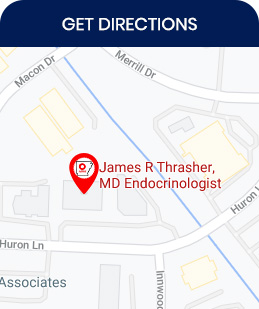Chronic Endocrine Disorders Treatment Specialist in Little Rock, AR
If you are suffering from diabetes along with the symptoms such as mood swings, fatigue, fluctuation in weight or cholesterol level, it might be possible that the actual cause is chronic endocrine disorders. Dr. James Thrasher, is our leading endocrinologist and research scientist at Arkansas Diabetes and Endocrinology Center who will provide you with comprehensive treatment. For more information, contact our office to schedule an appointmen.. We serve patients from Little Rock, AR and surrounding areas.


Table of Contents:
What is chronic endocrine disorder?
What are the major endocrine conditions?
What is the most common cause of endocrine disorders?
Are endocrine disorders life threatening?
Dysregulation of the endocrine system, which includes the glands that secrete hormones, the receptors that respond to hormones, and the organs directly affected by hormones, can lead to endocrine disorders. Any of these points can become dysfunctional and have profound effects on the body.
Some of the most common types of endocrine disorders are:
– Menopause
Menopause is the time that marks the end of the menstrual cycle. It is diagnosed after you have not had a period for 12 months. Menopause can occur in your 40s or 50s, but the average age in the United States is 51. Menopause is a natural biological process.
– Diabetes
Diabetes is a chronic (long-term) disease that affects the way your body turns food into energy. Your body breaks down most of the food you eat into sugar (glucose) and releases it into your bloodstream. When your blood sugar rises, it signals your pancreas to release insulin.
– Addison’s disease
Addison’s disease, also known as adrenal insufficiency, is a rare condition that occurs when the body does not produce enough of certain hormones. In Addison’s disease, the adrenal glands produce too little cortisol, and often too little of another hormone, aldosterone.
– Cushing’s disease
Cushing’s syndrome can cause excessive roundness of the face, weight gain in the middle and upper back, thinning arms and legs, easy bruising, and stretch marks. Cushing’s syndrome occurs when your body over time has too much of the hormone cortisol.
– Barlow’s disease
Mitral valve prolapses, also known as a click-and-click syndrome, Barlow’s syndrome, balloon mitral valve, or soft valve syndrome, is swelling of one or both mitral valves (leaflets) into the left atrium during systole.
– Hashimoto’s thyroiditis
Hashimoto’s thyroiditis causes your thyroid gland to not produce enough thyroid hormone. This is an autoimmune disease. This happens when your body produces antibodies that attack thyroid cells. Symptoms may include an enlarged thyroid gland (goiter), tiredness, weight gain, and muscle weakness.
– Hyperthyroidism/hypothyroidism
Hyperthyroidism is an overactive thyroid gland (when it produces too much thyroid hormone). Hypothyroidism is an underactive thyroid (when not enough of it is produced). Hypothyroidism is more common than hyperthyroidism. Although the two conditions have different signs and symptoms, they sometimes overlap.
– Prolactinoma
Prolactinomas are benign tumors of the pituitary gland. This tumors causes the pituitary gland to produce too much of a hormone called prolactin. The main effect of prolactinoma is lowered levels of certain sex hormones namely estrogen and testosterone. Prolactinomas are not life-threatening.
– Endocrine carcinoma
A special type of cell in the pancreas that produces insulin and other hormones that help control blood sugar (glucose) levels. Also known as pancreatic endocrine cells or islet Langerhans cells. Pancreas (called pancreatic NET or pNET).
Endocrine dysregulation is usually the result of a hormone imbalance, a condition characterized by glands producing too much or too little hormone. This imbalance can be caused by:
Problems with the endocrine feedback system – its main job is to maintain a perfect balance of hormones in the body, but it can malfunction and cause an imbalance:
– genetic disease
– infection or disease
– endocrine gland damage
Endocrine disorders can also occur due to nodules or tumours in the endocrine system. Although an endocrine nodule or lump is rarely cancerous or spreads to other parts of the body, it can disrupt hormone production in the endocrine system.
While each endocrine disorder has its own set of symptoms, some of the most common symptoms are:
– Mood swings
– Fatigue
– Weakness
– Unexpected weight fluctuations
– Changes in blood sugar or cholesterol levels
Endocrine disorders can lead to life-threatening conditions if left untreated. If symptoms persist for more than three days, patients need immediate medical attention. Some risk factors associated with endocrine disorders are:
– Low heart rate can lead to heart failure
– Fatigue
– Myopathy (weakening of muscle fibers leading to neuromuscular disease)
– Encephalopathy (An acute state of confusion and delirium.)
– Coma
– Paralysis
– Stroke
– Nervous system damage
For more information about endocrine disorders, call us. We serve patients from Little Rock AR, Conway AR, North Little Rock AR, Pine Bluff AR, Hot Springs AR, Benton AR, Sherwood AR, Russellville AR, Jacksonville AR, Cabot AR, Searcy AR, Bryant AR, Jonesboro AR, Forrest City AR, Magnolia AR, Camden AR, Malvern AR, Batesville AR, Arkadelphia AR, Clarksville AR, Monticello AR, Heber Springs AR, Morrilton AR, Stuttgart AR, Greenbrier AR, Sheridan AR, and Vilonia AR.







